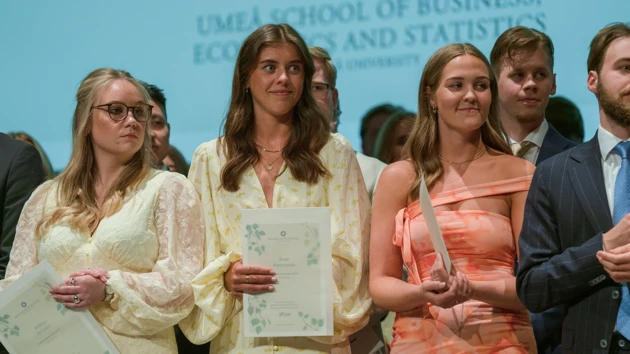Master's Programme in Cognitive Science 120 credits

About the programme
How do we perceive the world? How should we understand memory, language and consciousness? Are human thought processes unique, or can other organisms - maybe even machines - think in ways that is similar to how we do it? You will have the opportunity to probe these questions from the perspective of psychology, linguistics, computer science, philosophy and neuroscience. The program is research connected, but also gives you knowledge and skills that are useful in a variety of non-academic domains.
Interdisciplinary programme
Great opportunity to tailor education to your interests
Strong focus on research
While studying
The programme is aimed at you who wish to deepen your knowledge in the field of cognitive science. The education includes a broad mix of courses that each touch upon some aspect of cognitive science and that together give an overview of the field. The first year can be seen as a sort of smorgasbord of courses that will give enhanced knowledge in subjects ranging from research design and data collection, to consciousness and cognitive neuroscience, and that ends with a thesis. The second year gives you enhanced knowledge in data analysis and brain imaging techniques. You also have the opportunity to adapt the programme according to your own areas of interest.
A multidisciplinary programme
The programme is multidisciplinary, which is highlighted by the fact that the courses are given by a total of five different departments. The Department of Psychology coordinates the programme and is also responsible for a few of the courses. The remaining courses are given by the Department of Historical, Philosophical and Religious studies, the Department of Language Studies, the Department of Computer Science, and the Department of Integrative Medical Biology.
Theory courses during the first year
The first semester starts with two theory courses – one in research design and data collection, the other in higher cognitive functions. You will learn to understand and design scientifically sound research projects, while learning more about theories and empirical studies of mental processes. You will then take two additional courses in parallel. The first is a philosophy course that concerns the problem of consciousness from a philosophical perspective. The other is about the relationship between language and cognition, for example, how development and representation of language is affected by cognitive factors.
The second semester begins with a course about theoretical perspectives on cognitive science where questions and problems of a more theoretical nature will be discussed and analyzed. In parallel with this runs a course in cognitive neuroscience, with main emphasis on central concepts, theories, and empirical findings. The course also addresses the relationship between neuroscience and artificial intelligence. During the second part of the semester you will write a 15 credits master’s thesis, which is a good opportunity for practice and preparation for the 30 credit thesis of the last semester.
The second year of training is more practical
The fall semester starts off with an individual project course where you will be given the opportunity to work within ongoing research projects related to cognitive science. The idea behind this project course is to give students opportunities to get hands on experience of how research and development projects are conducted. In the second part of the semester you will take a course in data analysis, which builds on the methods course of year one and focuses on different ways to analyze data. In parallel with this runs a course in brain imaging, with a particular focus on fMRI from a theoretical and practical perspective. During the final semester, you will write a 30 credits master’s thesis.
Tailor your education
There are opportunities to adapt your education within the programme.
The Programme syllabus recommends that you write two theses. One 15 credit thesis during the first year and one 30 credit master thesis during the second year. This, along with the individual project during the 3rd semester, 15 credits, provides each student with a high-quality, research-oriented and unique education.
Language
All teaching is conducted in English.
Studying abroad
You can spend one semester at one of Umeå University's partner universities and transfer the credits to include in your degree, contact your study counsellor in the beginning of the program if you are interested. Read more about our partner universities.
Fees and Financial Aid
With a few exceptions, all citizens of countries outside of the European Union (EU), European Economic Area (EEA) and Switzerland are required to pay application and tuition fees for education at the undergraduate and advanced level. Umeå University will be offering a limited number of scholarships to students from outside the EU/EEA.
Read more about Application and Tuition Fees at Umeå University
Read more about Scholarships
Programme overview
Year 1
Research Design and data collection, 7,5 Credits
Higher cognitive functions, 7.5 Credits
The problem of consciousness: Philosophical and empirical aspects, 7.5 Credits
Language and cognition, 7.5 Credits
Theoretical Perspectives in Cognitive Science, 7.5 Credits
Central Topics in Cognitive Neuroscience, 7.5 Credits
Master's thesis in cognitive science, 15.0 Credits
Year 2
Individual project in cognitive science II, 15 Credits
Data-analysis, 7.5 Credits
Brain Imaging, 7.5 Credits
Master's thesis in cognitive science, 30 Credits
Future and career opportunities
A Master's degree in Cognitive Science is a good preparation for conducting research, both in academia and the industry. Many employers seek cognitive science graduates because of their understanding of how to make complex information, technology and systems more accessible.
Degree
Degree of Master of Science (60 credits), main field Cognitive Science.
Degree of Master of Science (120 credits), main field Cognitive Science.
Apply
Voices about the programme
-

Two of the best teachers I’ve had in seven years of university studies
Alumni
Silvia tells about why she applied for the programme and what she thinks of Umeå
-

Student well-being is made a high priority
Alumni
Read more about what Eric liked the most with the programme
Frequently asked questions
Is it mandatory to take the full two years or can you graduate after just one year?
It is possible to study for a One-year Master by finishing the first year with a 15 credits thesis.
What are the different career options after graduation?
A Master's degree in Cognitive Science is a good preparation for Ph.D. research as well as for work in research and development in the industry. Many employers seek cognitive science graduates that have and understanding of human behaviour and technology as well as skills to perform empirical studies.
Do you have more questions about the programme?

Contact the study advisor
Johannes Braf
studievagledning.psy@umu.se
Related information

Chat with our students!
Are you wondering what it's really like to study at Umeå University? Ask one of our current students.

Experience Umeå
Here are the top 7 reasons to live and study in Umeå.

Finding accomodation
Find a place to live. Housing options for international and exchange students.

How to apply
A step-by-step guide to apply for studies at Umeå University.

Scholarship opportunities
Find out more about merit-based scholarships for full-degree programme studies.

Umeå University tops international student satisfaction survey
#1 globally in three of the five main categories: living, support, and overall satisfaction.
Contact us
Your message goes to Infocenter, and they’ll make sure it gets to the right person – so you get the best and most relevant reply.